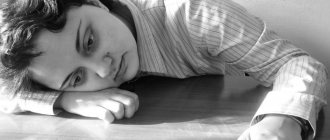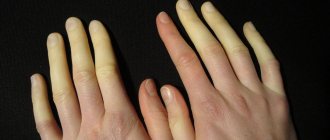Hypochondriacal depression is an atypical affective disorder characterized by a combination of depressive symptoms and manifestations of hypochondria. The patient feels depressed and is overly concerned about his or her health. A person interprets the state of internal organs pessimistically, distorts natural sensations, perceives with fear any problems in the functioning of the body, anticipates his own ill health, or is overwhelmed by an obsessive conviction of the presence of a difficult-to-treat somatic illness.
The patient believes that doctors are inexperienced or deliberately hiding the truth from him, while he believes that he correctly diagnosed his own illness. The hypochondriac’s doubts do not disappear even after numerous medical examinations and tests. A person with hypochondria stubbornly refuses to agree with the objective arguments of doctors. He is convinced of the futility of medical manipulations and is confident of the inevitable unfavorable outcome of the disease.
Hypochondriacal depression is often chronic with periodic relapses. Hypochondria is characteristic of emotional, suspicious, easily suggestible individuals. Neurosis is common among elderly and senile people, among teenagers. Hypochondriacal depression often occurs in medical university students who “try on” the symptoms of the diseases being studied. A larger number of patients with hypochondria are female.
Most hypochondriacs are erudite, well-educated, well-read people. They like to improve their level of education on their own, using available sources - websites on medical topics, books by traditional healers, sensational television programs.
Causes of hypochondriacal depression
The foundation for the emergence of hypochondriacal depression is a specific personal portrait formed due to the characteristics of childhood. The cause of future hypochondria is overprotection of the child and anxiety of the parents. Overly caring adults closely monitor the health of their offspring, running to the doctor because of the slightest scratch. They constantly frighten the child with the fact that he can catch a cold, get hurt, or become infected. Protect the baby from any contact with a potentially dangerous environment. They give clear examples of how a careless person fell ill with a fatal disease. Parents require immediate communication from the child if any unusual beliefs arise.
Adults constantly criticize doctors for their illiteracy and irresponsibility. They say that in our country medicine only cripples patients. From early childhood, parents put a non-functional attitude into their children’s heads, the essence of which is: you need to fight for health yourself and you should sound the alarm at the slightest sign of illness. The child absorbs the parent's way of thinking, becoming a suspicious and wary person.
The hypochondriac pays close attention to internal processes. Actively uses self-observation of the body, thus trying to displace interpersonal problems, conflicts in society, and painful loneliness from the sphere of consciousness. Many patients with hypochondriacal depression have difficulties in social interaction and have often been misunderstood and rejected by society. They have a very narrow circle of friends and are burdened by the lack of personal and friendly relationships.
Instead of making efforts to create and maintain meaningful contacts, it is more convenient and easier for hypochondriacs to use “flight into illness,” justifying inactivity by ill health. The only acceptable communication option for patients with hypochondriacal depression is to regularly notify others about painful symptoms.
- Many people with hypochondria are self-centered people. They are fixated on themselves and indifferent to the problems of others. They are not accustomed to being interested in the well-being and experiences of loved ones. At the same time, they require people to pay attention and respect for themselves. The spiritual life of selfish people is very poor and boring; often their only “interlocutor” is their own body.
- Hypochondriacs are characterized by suspicion, touchiness, and vindictiveness. Patients with hypochondriacal depression are often convinced that those around them are plotting and plotting against them. They try their best to identify ill-wishers and are in anticipation of an enemy attack. At the same time, sizzling feelings of anger and hostility destroy the hypochondriac’s body from the inside, creating physiological symptoms of imaginary diseases.
- Hypochondriacal depression often occurs in people with low self-esteem who are prone to self-blame and self-flagellation. Patients with hypochondria on a subconscious level want to be punished. Finding illnesses in oneself is a way to achieve “justice” of life for people who consider themselves unworthy to live in this world.
- The cause of the manifestation of hypochondriacal depression is often physiological changes in the body's functioning caused by stress factors. When faced with extreme circumstances, a person, in addition to a psychological shock, is faced with unpleasant sensations from the autonomic nervous system. The naturally determined inability to change the physiological state through the efforts of will greatly frightens an anxious person. A person does not correctly interpret the manifestations of a crisis during VSD, which is why he develops an erroneous understanding of his condition.
- Negative personal experience. A long-term illness, forced temporary isolation from society, staying in uncomfortable clinical conditions, unpleasant manipulations, and painful sensations create a fear of recurrence of the disease in the future. A person strives with all his might to prevent such a traumatic experience, so he observes the body in order to catch the first symptoms of ill health. The psyche has a unique ability: the more we listen to the signals of the body, the more persistently we think about illnesses, the sooner signs of illness will develop.
- Death or serious illness of a relative. For example, when a loved one who considered himself healthy is given a terrible diagnosis, and he soon dies, spending the last days of his life in agony. Against this background, an anxious, suspicious person has obsessive fears for his health.
Risk factors, classification and complications
You are at risk of developing this pathology if there is at least one factor:
- Are you experiencing extreme stress at this time in your life?
- Insults and beatings in childhood;
- A serious illness in childhood, or a serious illness suffered by a relative;
- Frequent browsing of health-related websites;
- You are too prone to worry.
- Hypochondria is divided into several types according to the symptom complex:
- Astheno-hypochondriacal syndrome (depressed mood and lethargy);
- Depressive-hypochondriacal syndrome (against the background of constant anxiety, falls into an inadequate state and commits desperate acts);
- Senesto-hypochondriacal syndrome (belief in supposedly real unusual phenomena that occur in the patient’s body, for example, a numb body);
- Anxiety-hypochondriacal syndrome (constant worry about health).
The second type is considered the most severe of them, because it can lead to significant problems:
- Frequent quarrels with family and friends;
- Constant absences from work;
- Financial difficulties due to too frequent visits to the clinic;
- Alcohol and drug abuse.
This pathology is chronic and can last for years. In some cases, symptoms recur. Only 10% of patients are completely cured of this pathology.
Symptoms of hypochondriacal depression
This atypical affective disorder is represented by two groups of symptoms: depressive and hypochondriacal syndrome.
Signs of depression are:
- the predominance of a bad mood regardless of actual circumstances;
- inability to enjoy enjoyable activities;
- loss of interests, indifference to current events;
- decreased performance and deterioration of labor results;
- the emergence of ideas about the meaninglessness of further life due to poor health that cannot be eliminated.
The motor activity of a person with hypochondriacal depression is characterized by instability and unpredictability of changes in the “poles”. A patient with hypochondria, overwhelmed by obsessive experiences, spends most of his time alone, locked within his apartment. He doesn't want to take any action. The subject feels weak and exhausted, unable even to carry out banal hygienic procedures. He refuses to communicate with friends, answers questions from relatives in monosyllables, and stops performing household functions and work duties.
Suddenly, a person with hypochondria may experience an attack of rage. He begins to reproach his loved ones for not paying enough attention to his condition. He accuses his relatives of not caring for him properly and not wanting to put himself in the position of a sick person. A patient with hypochondria blames his household for being the cause of his ill health. He says that in order to satisfy their benefits, he was forced to work hard, and regular overload undermined his health. He makes claims that due to the need to provide for his spouse and children, he could not fully rest and deprived himself of many benefits, at the same time he does not respond to the fair arguments of his relatives and denies their well-founded arguments. Statements from relatives that he is exaggerating his ill health drive the hypochondriac into a state of rage. In a state of passion, the subject loses control over his actions and can cause serious harm to others.
As a rule, after a fit of rage, a period of “painful insight” occurs. A person with hypochondria is convinced that only he himself must fight to save his life. A person convinced of the presence of an incurable disease makes an appointment with different doctors and insists on using all existing diagnostic methods.
A hypochondriac is never satisfied with the results of the examination; he is convinced that “the donated blood was mixed up with another person’s test,” “the ultrasound machine was not working properly,” “the doctor is not properly qualified,” “the doctor is deliberately not telling the truth.”
In such a situation, hypochondriacal depression can reach the level of delusional disorder. Convinced of the negligence of doctors, a person with hypochondria begins to complain to all possible authorities. He tries to gain public support by tirelessly talking about “stupid doctors,” actively disseminating false information on social networks and becoming a regular visitor to medical forums.
Not receiving the desired reinforcement from society, the hypochondriac begins to heal himself. Convinced of the presence of a certain physical illness, he purchases pharmaceutical drugs and takes pills without observing the dosage. The patient tries on himself all existing folk remedies, visits healers, healers, and magicians. After meaningless energetic activity, the hypochondriac begins a period of loss of strength. He again becomes passive and inhibited.
Signs of hypochondria are:
- excessive concern about health;
- confidence in the presence of a serious, difficult to diagnose disease;
- fears that timely medical care will not be provided in case of a sudden deterioration in health;
- panic fear of developing complications of an imaginary illness;
- anticipation of the upcoming painful treatment, painful medical procedures;
- obsessive thoughts about the hardships and deprivations associated with staying in the hospital;
- regular occurrence of annoying “pictures” of one’s own disability;
- irrational fear of premature death.
Symptoms of hypochondriacal depression are the appearance of painful, debilitating, unpleasant sensations without clear localization in the body or emanating from internal organs, on the skin. Senestopathies occur in the real absence of physiological defects. The patient indicates that pain “migrates” throughout the body; he feels “heaviness,” “transfusion,” “pressure” in different parts of the body.
In severe cases of hypochondriacal depression, delusional inclusions are determined. The patient assures those around him that his “internal organs have decomposed,” “his body is rotting,” “his intestines are filled with molten liquid,” “a lead ball is inserted into his head.”
- The main symptom of hypochondria is a distorted interpretation of harmless and non-dangerous physiological phenomena. At the same time, the patient ignores the possibility of a traditional explanation for the unpleasant sensations. For example: with a headache, a person is convinced that he has a brain tumor. He is not satisfied with the explanation that cephalalgia naturally occurs during mental stress. If a person coughs in a dusty, dirty room, he claims that he has tuberculosis. He interprets pain in the stomach as a manifestation of a peptic ulcer, not taking into account that the pain syndrome is provoked by his prolonged fasting.
- A typical sign of hypochondria is constant monitoring of health indicators. The patient can measure blood pressure and body temperature every half hour. Once a week he will undergo clinical blood and urine tests. Convinced of the pathology of some organ, the hypochondriac will perform an ultrasound using not one, but five machines. The hypochondriac monitors the condition of the mouth, hair and nails. Records frequency of urination and bowel movements.
- With hypochondriacal depression, sleep disorders naturally occur. In the evening, the patient is burdened by the fact that he cannot fall asleep. At the same time, worrying about lack of sleep does more harm than the actual fact of insomnia. A hypochondriac may experience panic fear before going to bed, because he is sure that some dangerous attack will happen at night. Having fallen asleep, he has nightmares where he sees himself confined to a wheelchair or on his deathbed.
- A symptom of hypochondriacal depression is a change in eating behavior. Most often, the patient loses his appetite, eats little and loses a lot of weight. At the same time, a person interprets weight loss as a sign of a fatal disease.
Literature:
- Neuroses: pre-disease, dynamics, outcomes / K. T. Sarsembayev, M. A. Lebedev; edited by N. M. Zharikova. - Moscow: Medicine: Shiko, 2007. - 190 p.
- Psychiatry, medical psychology [Text]: textbook / N. N. Petrova. - Moscow: KNORUS, 2021. - 507 p.;
- psychotic and neurotic disorders in patients with somatic pathology [Electronic resource]: a guide for doctors / A. M. Sprints, O. F. Eryshev, E. P. Shatova, I. N. Filippova. - St. Petersburg: SpetsLit, 2007. - 252 p.
The text was checked by expert doctors:
Head of the socio-psychological service of the Alkoklinik MC, psychologist Yu.P. Baranova, L.A. Serova, a psychiatrist-narcologist.
CAN'T FIND THE ANSWER?
Consult a specialist
Or call: +7 (495) 744-85-28
Call! We work around the clock!
Treatment methods for hypochondriacal depression
Orthodox medicine and traditional psychotherapy do not yet have the resources to rid the patient of all manifestations of hypochondriacal depression. Treatment of atypical affective disorder is a difficult task, since the disease is protracted, often chronic, with a high risk of relapse. Therapy of hypochondriacal depression is complicated by the fact that patients associate mental suffering with an imaginary somatic illness, and try to find arguments confirming the correctness of their assumptions. Drug treatment of patients with hypochondria is often contraindicated, and when carried out it brings the opposite effect - a deterioration in the person’s well-being. This is due to the fact that prescribing pharmacological agents to a hypochondriacal patient strengthens his confidence in the existence of physiological pathology. Therefore, the leading role in the treatment of hypochondria is given to psychological support and psychotherapy.
The choice of individual methods of psychotherapy is justified by the fact that the hypochondriacal components of depression often serve as a way to hide and repress unresolved personal conflicts. A person who is unable to admit the existence of disharmony between the inner world and the environment uses imaginary problems in the body as a defense mechanism to shift the vector of attention from the need to solve real problems to thinking about imaginary diseases.
- How to treat hypochondria? The main condition for overcoming hypochondriacal depression and preventing the return of the disease is to recognize the existence of a problem in the psycho-emotional sphere and be ready to transform the inner world. It is this step that often becomes difficult and impossible for hypochondriacs. Psychotherapists often encounter the fact that patients with a confirmed diagnosis refuse the doctor’s attempts to provide assistance and do not want to consider the painful condition from a psychological perspective. Many patients with hypochondriacal depression are obsessed with finding out if they have an illness and finding a doctor who could confirm this illness. Often, hints from a psychologist and psychiatrist about the need to use psychotherapeutic methods of treatment are regarded by patients as the doctor’s inability to understand them and a deliberate reluctance to prescribe “miracle” pills. Therefore, the primary action of the doctor is to interest the patient in the state of his inner world, stimulate him to work on himself and motivate him to transform his worldview.
- How to get rid of hypochondriacal depression? It is necessary to explore personal history and establish the circumstances of the traumatic experience. During psychotherapeutic sessions, the doctor helps the patient to objectively assess the conditions of his growing up, analyzing the system of rewards and punishments adopted in the family. The psychotherapist recommends that the hypochondriac think about whether the attitudes learned from his parents are benefiting him. The doctor points out that the existing stereotypical way of perceiving internal and external processes interferes with a full life, lowers a person’s self-esteem, and impedes personal growth. The doctor motivates the patient to make adjustments to the value system formed in childhood, which ultimately frees the mind from obsessive ideas about one’s own ill health.
- How to get rid of hypochondria on your own? To gain emotional and psychological stability and eliminate irrational beliefs, a person must live in harmony with himself and the world around him. It is necessary to learn to perceive events in life correctly, objectively, and not distortedly. You should not focus on minor problems of the body and tiny negative phenomena of everyday life. We need to stop “making mountains out of molehills” by turning ordinary problems into disasters.
- How to deal with hypochondria? A person needs to choose priority life goals and understand exactly how he wants to live. If the acceptable conditions of existence for a subject are illness, then he will never get rid of hypochondriacal experiences. When an individual chooses the goal of good mental and physical health, he acts to avoid harm to his body.
- How to cope with hypochondria? An important rule is that you need to stop living in the past and focus on the future. We need to stop reliving past failures, grievances, episodes of illness over and over again, and even more so transferring past adversities to the present. The hypochondriac must learn not to allow a certain problem from the past to spill over into his present.
If psychotherapeutic treatment does not show the desired effect, the doctor's efforts are aimed at minimizing hypochondriacal fears and depressive symptoms. In case of severe, persistent hypochondria, the patient is prescribed powerful pharmacological agents. The basis of drug treatment is tricyclic antidepressants with the active ingredient amitriptyline. For severe behavioral disorders, this drug is combined with antipsychotics. Amitriptyline can also be used in combination with dibenzopyrazinazepine derivatives, for example: mianserin.
It is advisable to treat hypochondriacal depression in a hospital setting. After discharge from the hospital, the person should continue treatment with antidepressants at home. You should not change the treatment regimen or dosage of the medication yourself. A hypochondriac is recommended to be examined by a psychiatrist at least once every three months. It must be remembered that recovery involves not only medical efforts and taking medications, it is, first of all, painstaking work on oneself, the care and attention of the patient’s relatives.
Diagnostics
The doctor’s main task during the examination is to differentiate hypochondria from somatic ailments.
In most cases, an accurate diagnosis is not established immediately. The patient has time to go through many specialists, sometimes several times. Hypochondriacal complaints imitate various pathologies. It is quite difficult for doctors to immediately find out their cause. It can be especially difficult if irregularities are found during tests and other studies. But after prescribing medication, patients do not feel better. And only after many ordeals does the client end up seeing a psychiatrist. >It is very important to carefully study all complaints, their nature, and the sequence of occurrence.
Hypochondria syndrome
represents constant obsessive thoughts about any disease. The patient pays too much attention to subjective sensations in his body. A hypochondriac is sure that his heart is beating abnormally or that he has problems with his intestines or other organs. There is a constant feeling of one’s own painful state. Often, large sums of money are spent on all kinds of tests and studies of one’s body.
Hypochondria itself is a manifestation of a neurotic disorder with a characteristic fear of getting sick.











